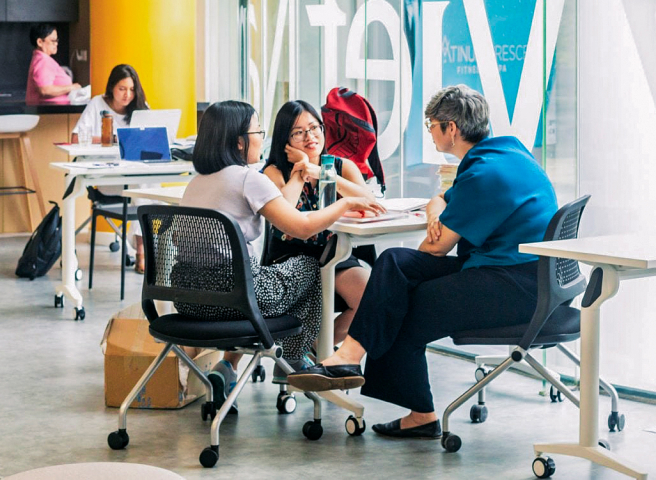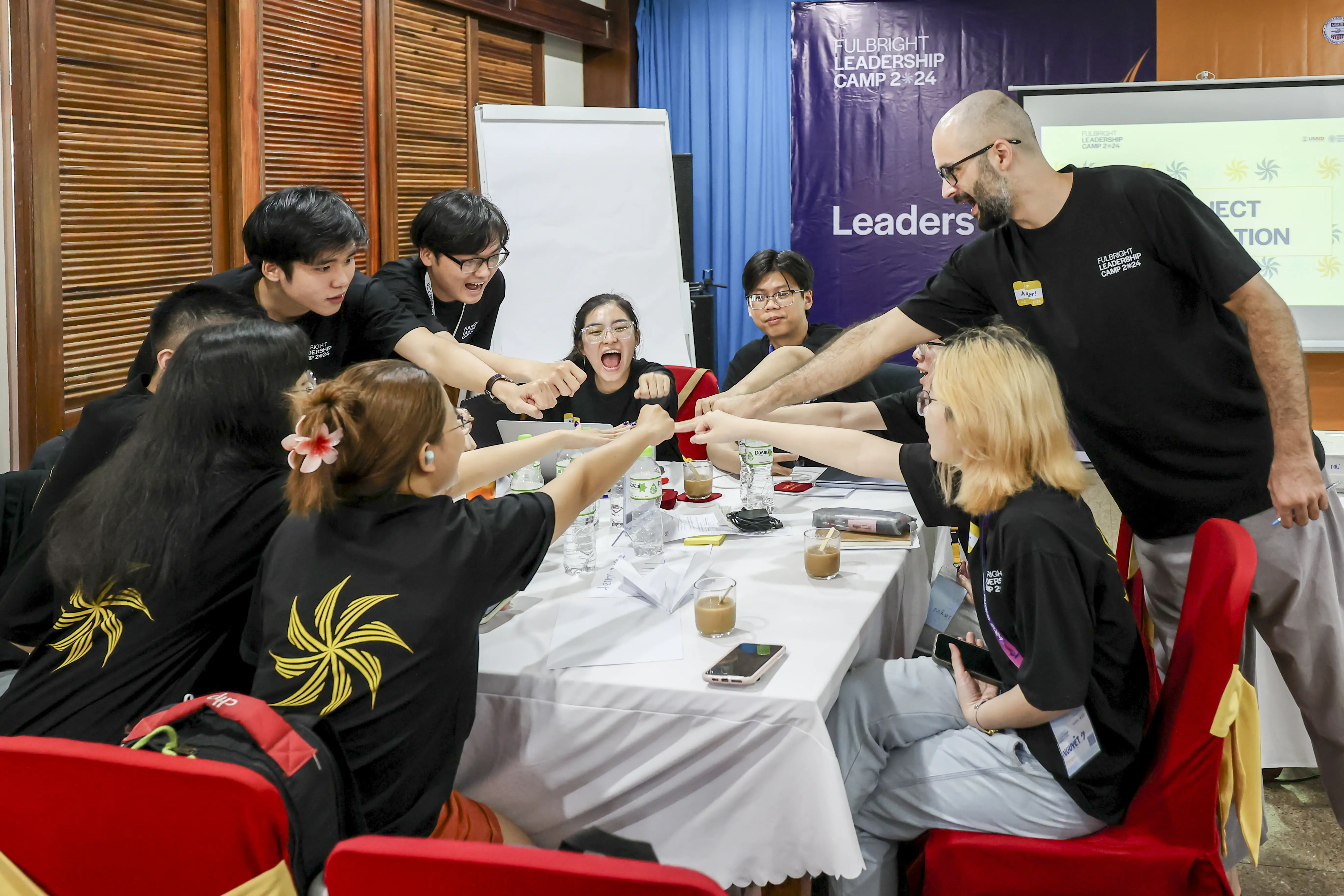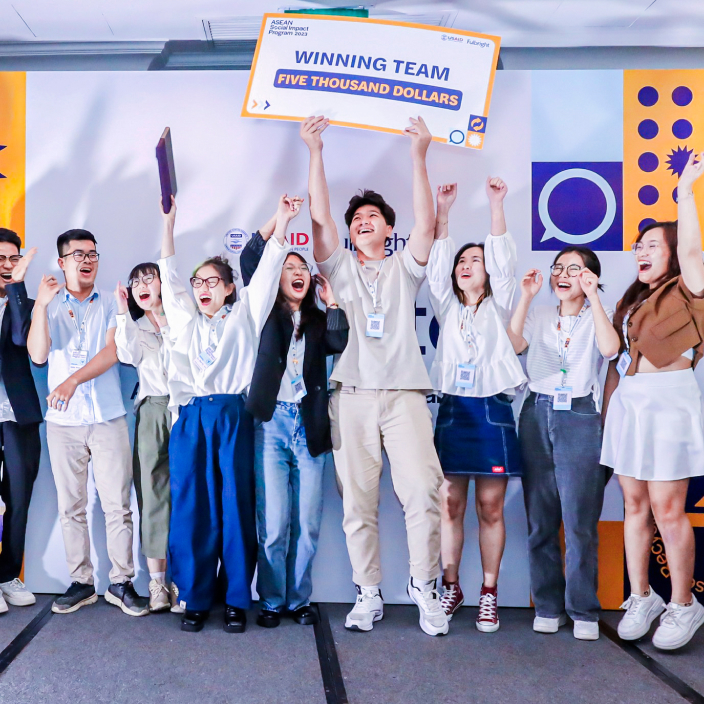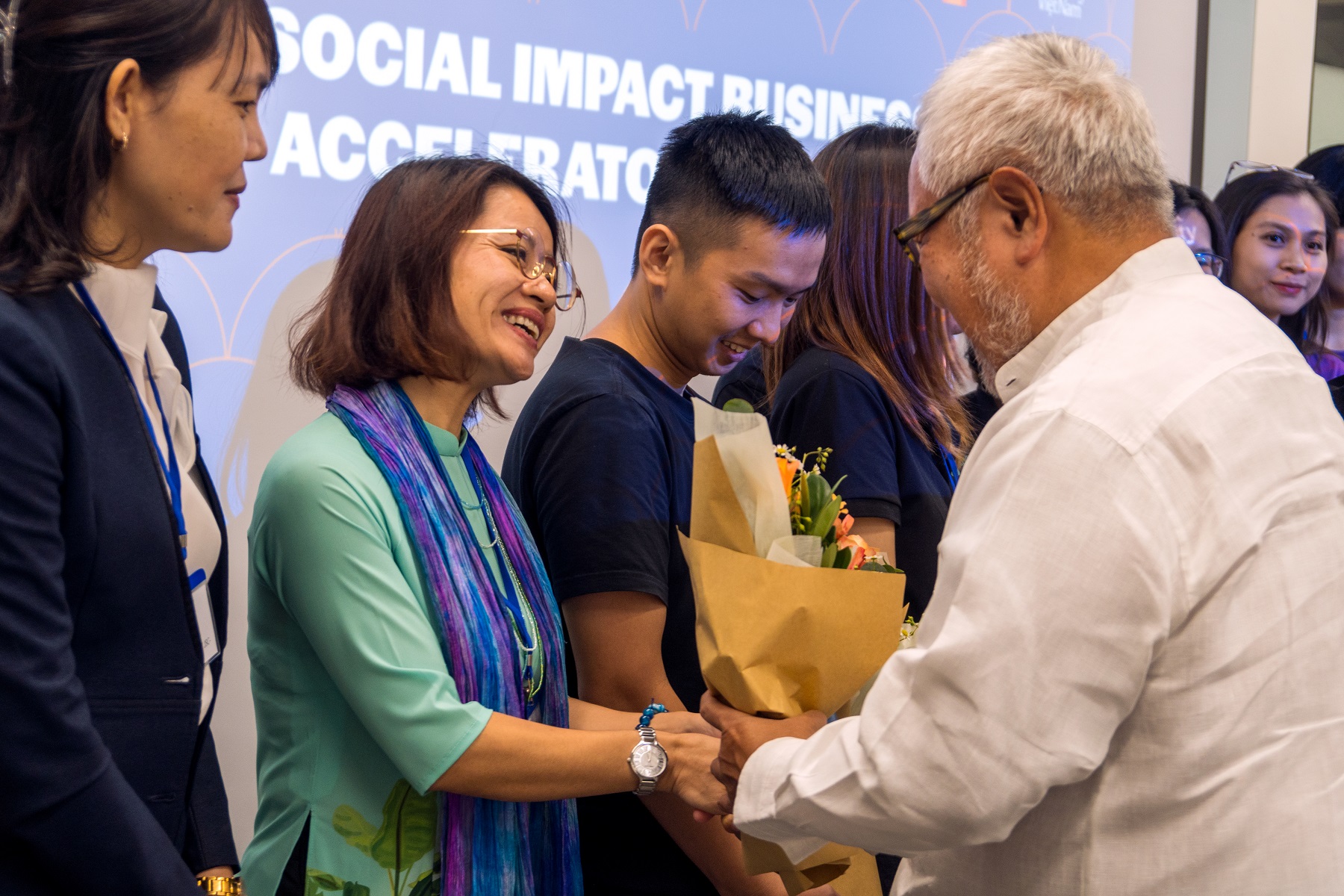
“As the world is facing many challenges and crises, we must do everything differently to change the system and ensure a sustainable future. One solution is to invest in education, in the people who can create positive impacts for our society,” said Mr. Nguyễn Phương Lam, a distinguished philanthropist in Asia, in conversation with Fulbright University Vietnam.
Alongside his generous gift to help Fulbright establish the Nguyễn-Phương Family Scholarship for undergraduate students, for the past years, Mr. Nguyễn Phương Lam has also dedicated himself to building training programs that further enrich the Fulbright’s community as well as the lives of Vietnam’s youth. One recent example is the Social Impact Business Accelerator Program which Fulbright co-organized with Acumen, a global nonprofit organization aiming to change the way the world tackles poverty by investing in companies and change-makers. Cultivating the next generation of leaders who will contribute to a just, caring and humane society is, after all, one of Mr. Nguyễn Phương Lam’s life missions.
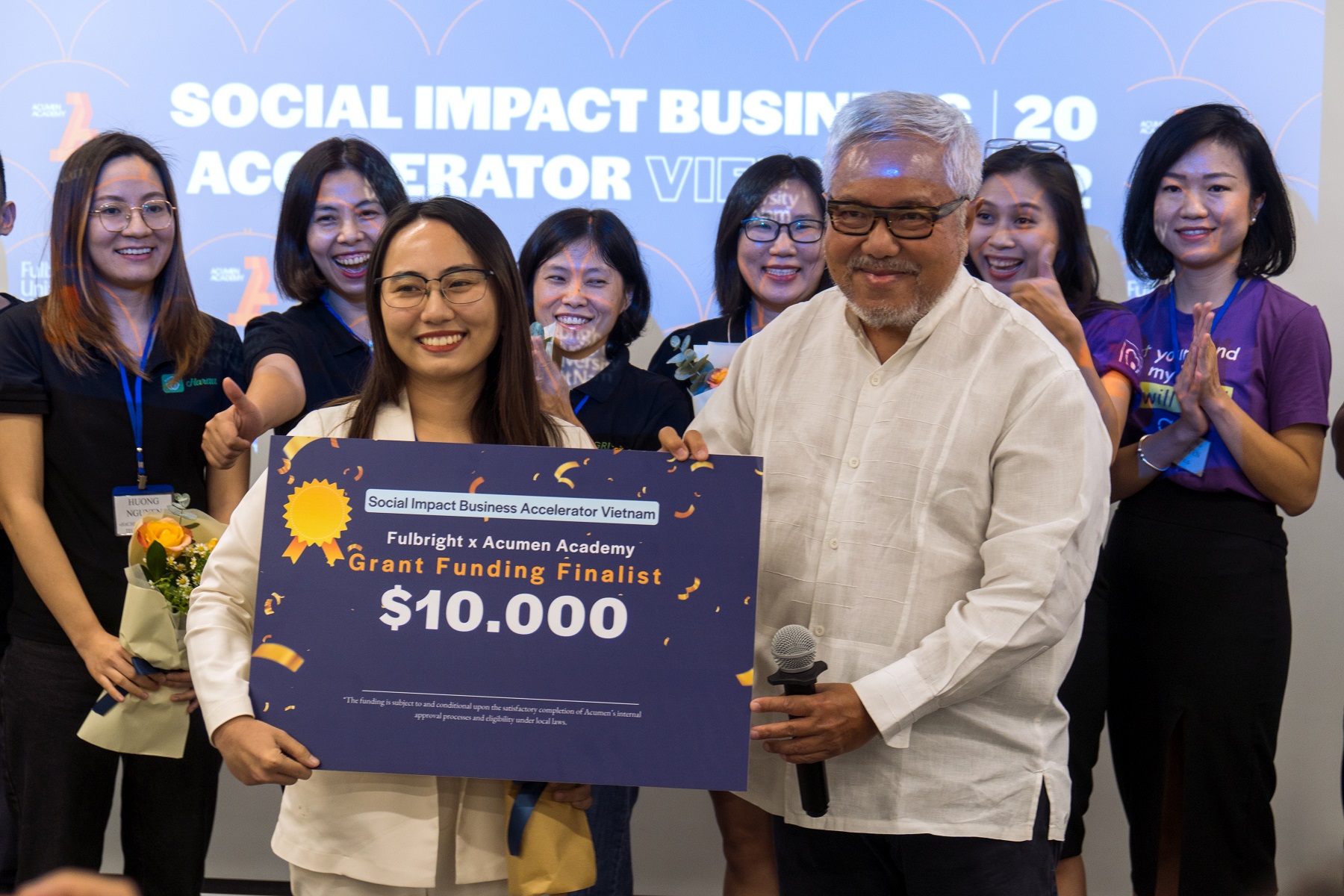
Mr. Nguyễn Phương Lam awarding WeGrow, a social business in Vietnam, with a seed fund of USD10,000 at the Fulbright x Acumen Social Impact Business Accelerator program.
“As mentioned above, I can see the issues facing the world today are getting more aggravating than ever. My gravest concern lies in climate change, which is a reality we can no longer deny nor turn a blind eye to, demanding our immediate action. Secondly, it’s the growing inequality and stalled social mobility for the world’s most underprivileged people that I deeply care about. As a result, my family and I are compelled to give to and support causes not only urgent, but by nature necessary,” he said.
On top of Acumen and Fulbright University Vietnam, Mr. Nguyễn Phương Lam also contributes to several social-impact funds and philanthropic organizations such as Ashoka, Endeavor, and Asia Philanthropy Circle, as a mentor, donor, or board member. “These are the platforms that focus on building capacity, so that people are empowered to bring about positive change in our community and society. Within these organizations, I’ve had the fortune of meeting and collaborating with many like-minded people; or as the old saying goes, ‘One tree doesn’t make a forest’”, shared Mr. Nguyễn Phương Lam.
His philanthropic efforts all share a commonality that’s deeply rooted in the belief, “Give a man a fish, and you feed him for a day. Teach a man to fish, and you feed him for a lifetime”. It’s a lesson he’s always treasured since he became one of the first Vietnamese students to study at the Stanford Graduate School of Business; after which, Mr. Nguyễn Phương Lam has built a successful career in global finance and investment at Ermgassen & Co. Ltd and JP Morgan & Co, among others, and eventually become a co-founder of the Private Markets division of Capital Group.
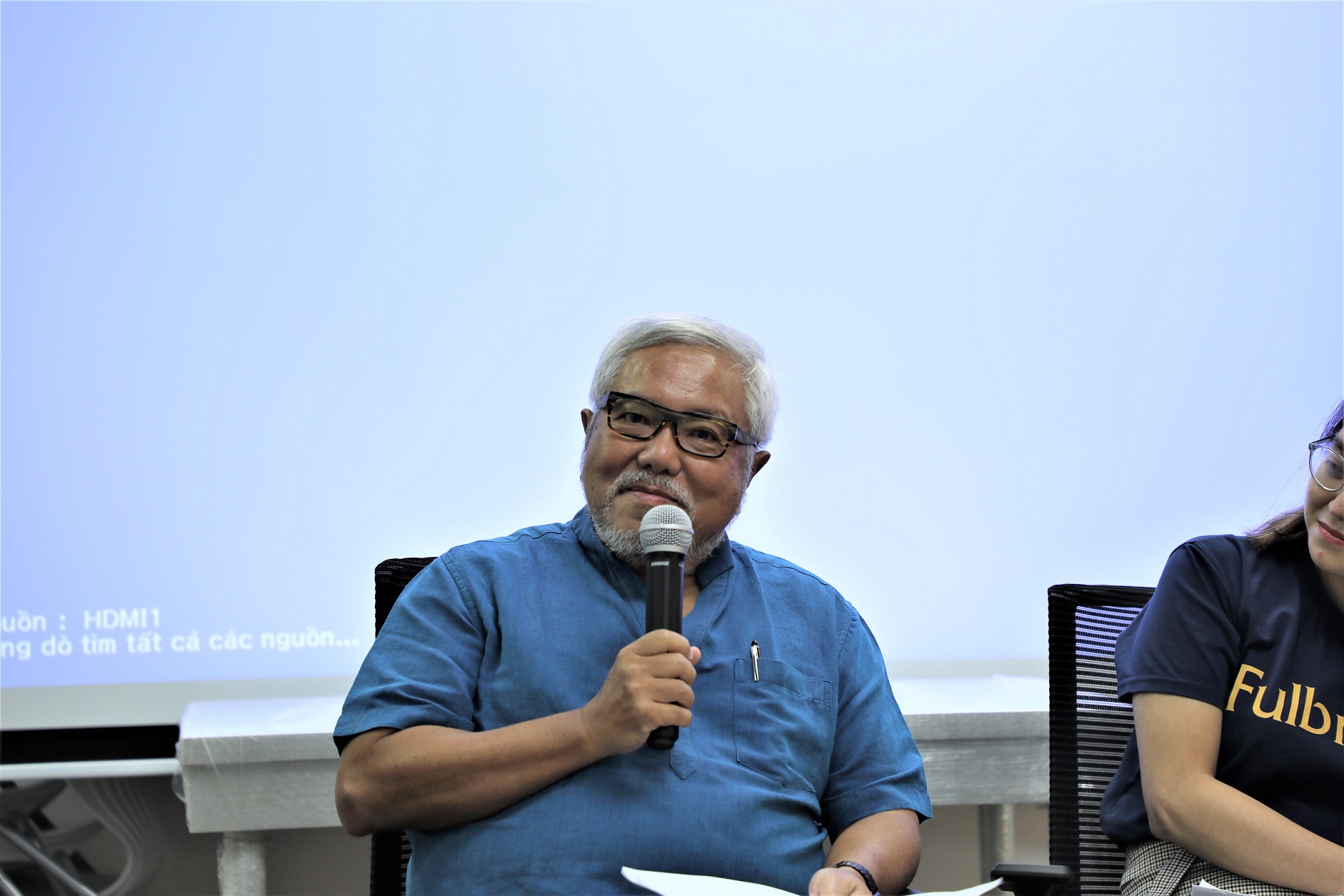
As an homage to the scholarship he received from Stanford, the first scholarship that Mr. Nguyễn Phương Lam founded was for students from Vietnam and other developing countries in Asia who wished to attend the Stanford Graduate School of Business. “It’s also a homage to my father, who encouraged me to pursue a Master’s degree at Stanford after I graduated with an engineering degree in France. Had I stayed in Europe at the time, or returned to Vietnam, there’s no doubt my life would have turned out different than it is today. But thanks to him, I’d spent some time considering my life choices, and finally decided to further my study in the United States. And so, I consider all that happened in my life a stroke of luck, a fortuitous combination of circumstances, and certainly couldn’t do without the guidance and wisdom of people like my father. That’s the reason why I wish to support young, talented Vietnamese people in their journey towards self-actualization,” he said.
We had a chance to sit down with Mr. Nguyễn Phương Lam during one of his visits to Fulbright University Vietnam. Here, he discussed the philosophy behind his philanthropic work, the role of education in today’s world, and what it means to become a change-maker.
Mr. Lam, it seems like your philanthropic work is mainly dedicated to the field of education?
I was once asked how I choose among causes to give. My answer was quite simple: I don’t set out with any particular field in mind; instead, I often pay close attention to the people who founded or now run the organization, to see whether or not they are truly committed. I’d like to understand the motivation behind their work – is it coming from the heart, or simply a means to satisfy one’s ego?
The fact that most of my philanthropic work revolves around education is, in a sense, purely a coincidence. I choose people, rather than their field of work. I believe that before you can change the world, you need to change your inner-self. Whether you’re running a social business, doing charitable work, or trying to help society in general, what you do might go nowhere, nor prove itself sustainable in the long run, unless you have put aside your ego. What’s worse, your action can inadvertently hurt, or do more harm to society, should you misplace your intention.
Why did you choose to support Fulbright University Vietnam, where you and your family have established the Nguyễn-Phương Family Scholarship for our undergraduate students?
I’ve been paying attention to Fulbright since its earliest days, and come to recognize that the values and the kind of culture that the university is built upon are very much aligned with that of my family and I.
The scholarships we support are those that strive to invest in human capital, meaning we are supporting the next generation of leaders and changemakers. Upon graduation, they can change not only one but thousands of lives; they will do the necessary work to enact positive social change, instead of making financial gain their sole motivation in life. And our country is in need of such people. And so, simply put, Fulbright was quite an easy choice for my family and I.
In your eyes, what could be considered the hallmarks of an education that nurtures future changemakers?
Three weeks ago, I had the pleasure of joining a small gathering with Fulbright students at the university’s campus. Compared to the students I met four years ago, I could see in them a significant change, a noticeable improvement. Meaning Fulbright has been carrying out a truly great education model, whose values and culture are deeply imbued in both faculty and students. Fulbright, from my perspective, is not a university that simply teaches higher education in English in Vietnam. For example, in the mid-1990s, UNESCO proposed the four pillars of education. Most schools would only aim for the first two, meaning teaching students “learning to know”, and “learning to do”. But Fulbright even goes further than that, to make sure its students are “learning to live together”, and “learning to be”.
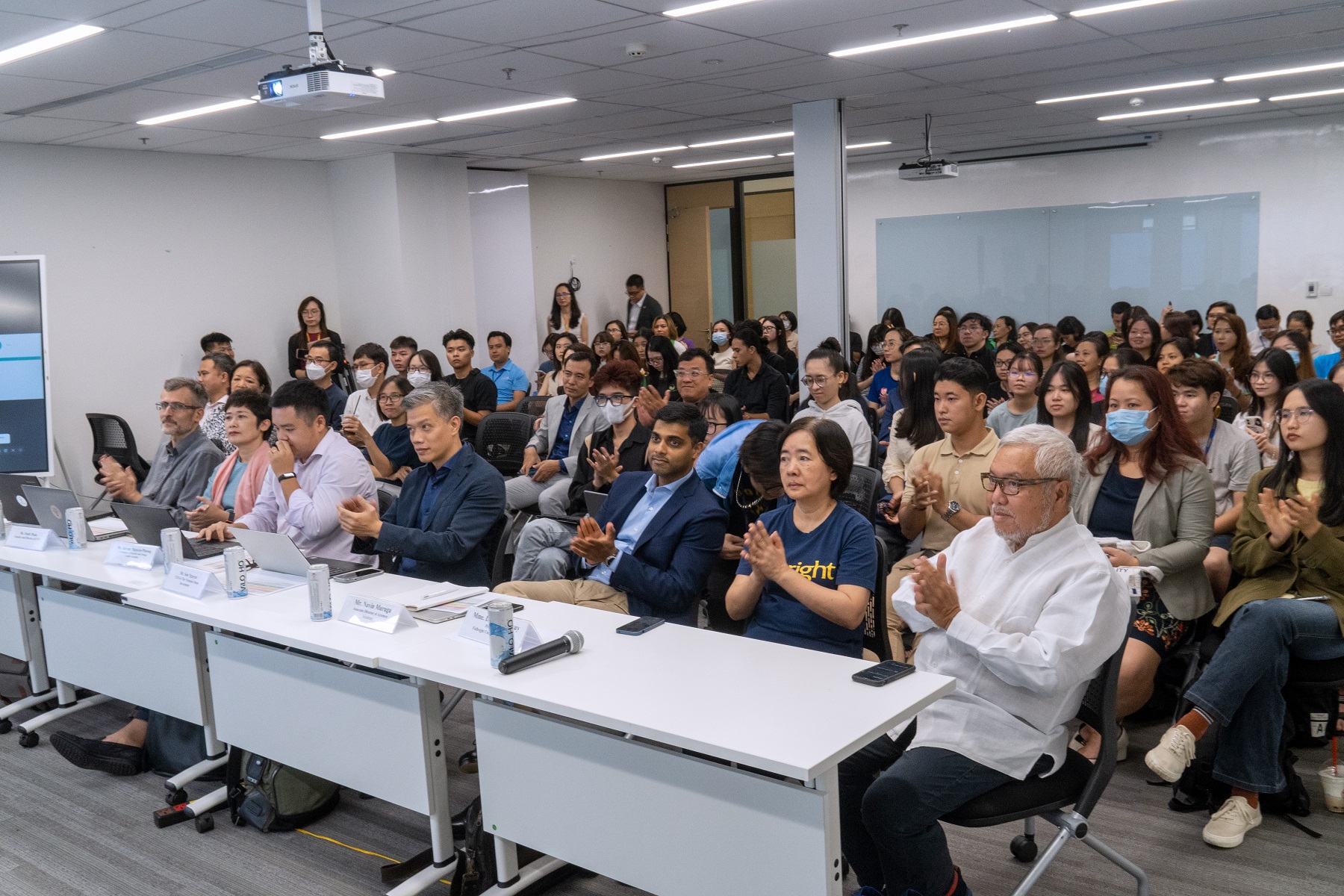
Mr. Nguyễn Phương Lam (far right) and the judges of the Fulbright x Acumen Social Impact Business Accelerator program.
It seems like these are the values that came from your own experiences?
From my observation, rather than trying to acquire a specific set of skills that only applies to one particular type of job, Fulbright students are learning how to learn. For whatever you learn in school can easily be forgotten should you not have the chance to put it into use in life, or in your professional career. Even so, the knowledge and skills one acquires in school can gradually become outdated in an ever-evolving world. But if we learn how to learn, that will be the foundation to see us through in life.
It’s not a personal philosophy, but a reality I have personally encountered. While I was working in finance, banking and investment, the colleagues who oftentimes excelled were not those who held a degree in economics or finance; instead, it was those who graduated from liberal arts schools. They could have entered the industry with a degree in Art History or Religious Studies – having nothing to do with business and banking in general. But it didn’t matter, as these firms always offer training programs for promising talents. And more importantly, these were the people who had learned how to learn, so they could adapt themselves to any kind of new environments, to have the ability and mindset to acquire any kind of new skills and knowledge coming their way.
In previous interviews, you spoke about the contrast, or shall we say contradiction, between having and being. Do you think giving is an integral part of being?
It depends on how you choose to give. (Laugh) One of the reasons that led to the crisis of modern civilization is because for the past hundred years, people have been obsessed with the idea of having, and so they fight, they hate, and even kill each other for it. It’s the origins for all sufferings in life. But they don’t understand that we are born with nothing, and we shall possess nothing when we’re gone. So what is the point of all these fighting? People forget about being – meaning who we are, what we are, and how to lead a meaningful life. Once we truly understand this, whatever we choose to do in life shall be more natural, and easier. All the pain and misery would also be resolved, or at the very least, abated.
We tend to think of giving as some kind of alms, and it’s not the definition of giving that I have in mind. There’s a saying of Lao Tzu that resonates with me until this day: “Give a man a fish, and you feed him for a day. Teach a man to fish, and you feed him for a lifetime”. And Bill Drayton, founder of Ashoka, once said, “Social entrepreneurs are not content just to give a fish or teach how to fish. They will not rest until they have revolutionized the fishing industry.” In other words, how can we make sure there won’t be another poor fisherman in the world?
Buddhism even goes further by teaching us that the true meaning of giving is when there’s no distinction between those who give, and those who receive. In other words, it’s a state where there shall exist no fisherman, no man in need of the fish, and even no fish – for these are one and the same. Giving is receiving, and receiving is giving. For those who give, in the true spirit of giving, they feel very glad and happy, because what they receive in return are intangible values that money can’t buy. Many people can work their whole life being oblivious to this, or they understand it only in theory and can’t truly live by it.
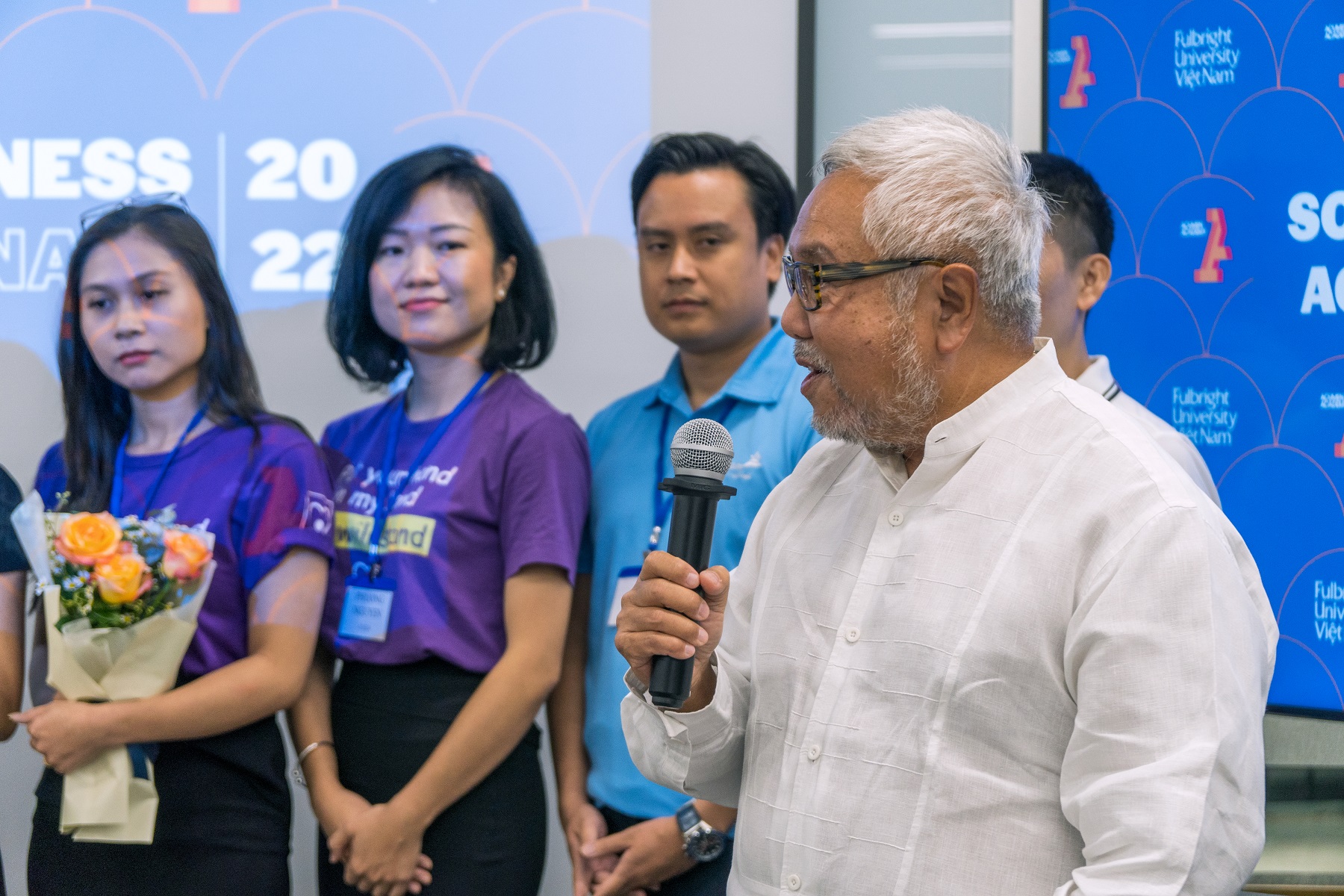
Studies have shown that spending money on others makes people happier than spending it on themselves. Is it related to what you’ve just said?
Indeed, but giving is not all about money. Money is only a very small part of giving. What we need to give is our sincerity. In the Bible, there’s a story where Jesus saw the wealthy coming into the temple and putting their gifts into the offering box, then he noticed a poor widow putting in two small coins. Who gave more in this case? The offerings of the rich were large, but it was nothing compared to their fortune. While those two coins were all but the widow’s livelihood, yet she gave it away with all her heart. In a sense, all the world’s religions teach us one thing, and it’s love. Love in the purest sense, instead of conditional love. Conditional love is not love, but a form of exchange.
Throughout this interview, you spoke about how our smallest, most genuine gesture can have the power to change the world. Having built a dedicated, and distinguished, career in philanthropy, do you consider yourself a change-maker?
To be honest, I don’t think I have the daring of a change-maker to come up with groundbreaking ideas and innovation. In my humble capacity, I can only identify and single out one change-maker from the others. But in all my work, I don’t think about legacy or how my name will be remembered. I’m nearly 70 this year; and what I’m concerned about is how humanity will continue to live on this planet. Naturally, you and I want to leave behind a future that’s sustainable and good for our children. And we should do everything in our capacity to ensure it. In other words, to answer your question, I don’t consider myself a change-maker, I’m simply an agent of change.
Thank you very much for this conversation.
Quyen Hoang
